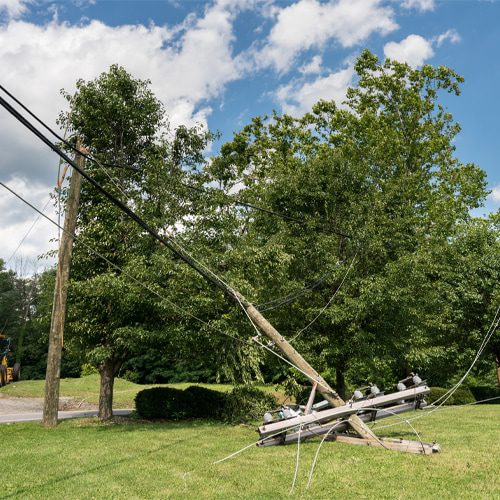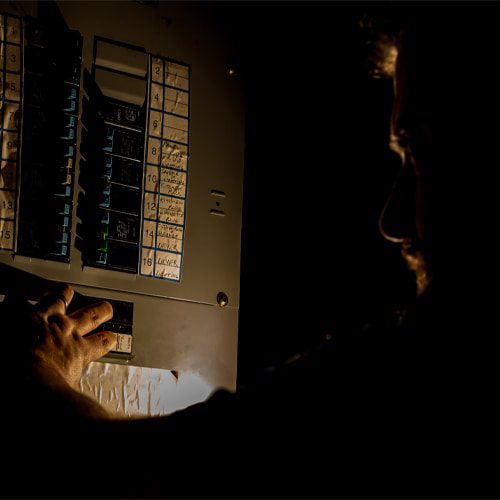Lexington/Richland County Power Guide
There can be a few obstacles when moving to a new area, but one that almost everyone complains about when moving to Columbia Metro is the confusion about utility providers. Many find it difficult to determine who their service provider even is, let alone what to do in a power outage.
Who is my electric company in Lexington or Richland County?
Trying to figure out who to contact for electric service in the Columbia and Lexington areas is one of the most frustrating things a new homeowner or tenant can encounter. There is just not a good way to know which utility provider you should be contacting.
You won’t find this information online, but here are a few ways you might be able to find out who to call:
- Check your latest utility bill or statement. What coop or utility provider is on your bill? Start there.
- Ask your neighbors what utility provider they use. It is likely yours is the same.
- Call each utility until you find the correct one. Even the utilities can’t tell you whether or not they service your neighborhood without your exact address. You can enter your address on the Dominion site, but it will not tell you if they service your electricity or just natural gas, so you’ll still have to call them to verify.
- MCEC is working on an online tool that will allow you to search your address yourself instead of calling customer service. The tool should be live sometime in the first half of 2021.
Once you know which provider is responsible for your electric service, make note of it and keep it handy with contact and emergency numbers in case of an outage or other electrical emergency.
Real-Time Power Outage Maps for Richland and Lexington County Electric Utility Providers
The first question most people have is, “How do I know if the electrical outage is in my home or with the utility provider?” Most people have no idea how to tell what has caused their power loss. It’s pretty common to peek outside and look for neighbors to ask about their power, who are also outside looking to see who has electricity. When you think about it, it’s a bit comical.
Jokes aside, it’s important to have up to date safety and service disruption information. Outage maps can be the easiest way to determine if there is a blackout in your area, but they aren’t that easy to find. Lucky for you, we found the best resources to know if you have an electrical failure in your Columbia/Lexington area neighborhood.
If you live in the midlands your utility provider will be one of three. Dominion, Mid-Carolina Co-Op and Tri- County Co-Op.
Dominion:
https://outagemap.dominionenergysc.com/
This outage map will show you all of the active reported service interruptions for Dominion.
Mid-Carolina Electric Co-Op:
https://mcecoop.maps.arcgis.com/apps/webappviewer/index.html?id=bcd794b1efa8472ea0de2a08723a88f9
If you are looking for maps showing electrical failures in just the Mid-Carolina Electric Coop service area, this outage map will give you all of the information you are looking for. The map shows all outages in the MCEC area with live updates for Columbia, the Town of Lexington, and their suburbs.
Tri-County Co-Op
Few homes are serviced by Tri-County Co-Op, but you may still have this utility provider if you live in Columbia or Lexington. For outage maps for only Tri-County Co-Op, click here.
http://outages.tce.coop/OMSWebMap/OMSWebMap.htm?clientKey=undefined
Where should I report a blackout?
Outage maps for the Midlands can be helpful for knowing if there is a power loss in your neighborhood, but it’s not going to give you all of the information you need to know. Even if the service disruption is occurring due to issues with generation and transmission of electricity, the utility provider you pay for your electric service is the one responsible for resolving outages that affect your home.
For Dominion Energy, contact 1-888-333-4465 or click to get live outage status updates. Click here to report a new Dominion Energy outage. You can also check out the linked chart below to sign up for Dominion Energy outage text notifications and to communicate with them via text as outages are resolved.
For Mid-Carolina Electric Coop, contact 1-888-813-9000 or click to get live status updates. Click here to report a new MCEC utility outage.
For Tri-County Co-op, contact 877-874-1215 or click to get live status updates or report a new Tri-County Co-op outage.

Why do power outages happen?
Failures in the electric grid can happen for a number of reasons, some obvious and some not so much. The most common cause of electrical outages is storm activity like lightning strikes, high damaging winds, and hail. But outages can happen for other reasons too, and some are even planned.
Where does my electricity come from? Path from Source to Home
Before you can understand how outages happen, you need to know how the electricity gets from power generation to your home outlet.
The path to your electricity in the Midlands begins with Santee Cooper. Santee is the utility company responsible for generating electricity for most of South Carolina, and all neighborhoods in the Columbia/Lexington area. From there, responsibility is transferred to the Central Electric Power Cooperative for transmission through over 800 miles of power lines to the utility provider that serves your neighborhood, then to your home’s electrical system.
Differences between blackouts vs brownouts vs rolling blackouts and why they occur
Did you know that some decreases in power or electrical blackouts are actually planned? You could also have a technical outage even if the electricity coming into your home has only decreased rather than ceasing completely. What type of blackout is occurring has a direct impact on how the utilities restore power. Here is what you need to know.
What causes total blackouts?
When most people think of power outages, they think of total blackouts. A total blackout means that there is no power coming into the neighborhood at all. In some cases you might be able to look outside your door and see the cause for the outage: a downed power line across the street, a limb from your front yard tree laying on the lines, or heavy ice and snow coating and weighing down the power lines.
Total blackouts can also be caused by:
- A vehicle colliding into an electricity pole
- Animals large and small can make their way into or onto electric utility lines or connections, damaging them significantly.
- Lightning strikes on nearby trees, utility poles, or other landscape features.
- Crews or individuals digging into the earth and tearing or breaking buried electric lines
- Transformers occasionally malfunction and require replacement.
What is a brownout?
A brownout is similar to a blackout, but instead of losing power completely you only experience a decrease in power. The decrease might be so small you can’t even really detect it, it could make your lights flicker, or it could be so exaggerated that none of your outlets or appliances will work. Brownouts can be caused by the same things as blackouts.
What is a rolling blackout, and why do South Carolina’s electric cooperatives use them?
Ah, now to answer the original question: Did you know that both blackouts and brownouts can be planned outages? Often in times of high energy use, utility companies will decrease or cease power to different areas intentionally. This frees up more of the grid for other areas not getting enough electricity. The idea is to make it fair so that everyone is inconvenienced at least a little bit. This most often happens in extreme heat or extreme cold when HVAC systems are running overtime.
Unfortunately, the utility company doesn’t really alert you as to when these will happen. You can sign up for text alerts with Dominion, but there is no other way to know in advance when these outages will occur unless you call the utility and ask them. You can see these outages on the outage maps, but only after they are in effect.
What to do during a power outage
Do you know what to do during a power outage? How quickly and effectively you respond to such events plays a large part in how you and your family come out of it. If outages are caused by storms, you will probably need to take additional precautions.
Preparing for a power outage
Do you know when the next power outage will strike? Of course not! Without a powerful psychic (or a planned blackout), no one can know what the future will bring. It is important to plan ahead for a blackout, as well as other emergency situations. Here are some tips:
- Freeze plastic water bottles so that when the power goes out they can help keep your food cold longer.
- Have plenty of candles, matches, lighters, lanterns, flashlights, batteries, etc.
- Make sure everyone knows what to do in a blackout and where supplies are located.
- Know where your main breaker box is located, as well as shut offs for the major appliances (like your HVAC).
Differences between blackouts vs brownouts vs rolling blackouts and why they occur

Did you know that some decreases in power or electrical blackouts are actually planned? You could also have a technical outage even if the electricity coming into your home has only decreased rather than ceasing completely. What type of blackout is occurring has a direct impact on how the utilities restore power. Here is what you need to know.
What causes total blackouts?
When most people think of power outages, they think of total blackouts. A total blackout means that there is no power coming into the neighborhood at all. In some cases you might be able to look outside your door and see the cause for the outage: a downed power line across the street, a limb from your front yard tree laying on the lines, or heavy ice and snow coating and weighing down the power lines.
Total blackouts can also be caused by:
- A vehicle colliding into an electricity pole
- Animals large and small can make their way into or onto electric utility lines or connections, damaging them significantly.
- Lightning strikes on nearby trees, utility poles, or other landscape features.
- Crews or individuals digging into the earth and tearing or breaking buried electric lines
- Transformers occasionally malfunction and require replacement.
What is a brownout?
A brownout is similar to a blackout, but instead of losing power completely you only experience a decrease in power. The decrease might be so small you can’t even really detect it, it could make your lights flicker, or it could be so exaggerated that none of your outlets or appliances will work. Brownouts can be caused by the same things as blackouts.
What is a rolling blackout, and why do South Carolina’s electric cooperatives use them?
Ah, now to answer the original question: Did you know that both blackouts and brownouts can be planned outages? Often in times of high energy use, utility companies will decrease or cease power to different areas intentionally. This frees up more of the grid for other areas not getting enough electricity. The idea is to make it fair so that everyone is inconvenienced at least a little bit. This most often happens in extreme heat or extreme cold when HVAC systems are running overtime.
Unfortunately, the utility company doesn’t really alert you as to when these will happen. You can sign up for text alerts with Dominion, but there is no other way to know in advance when these outages will occur unless you call the utility and ask them. You can see these outages on the outage maps, but only after they are in effect.
When an outage first occurs:
You have to act quickly in a power outage, especially if it is during severe weather. When the power first goes out, take these steps:
- Unplug all kitchen appliances, electronics, and major appliances. Turn off any minor appliances, like lamps. Alternatively you can turn off the main breaker to the house.
- Put all light switches in the off position.
- Get a light source going. Even if it is in the middle of the day, you don’t realize how dark the rooms of your home are until you try to access them in the dark.
- If you have an electrician-installed backup electrical system turn it on. Don’t use a portable generator on a home’s electrical system without the appropriate adaptations to your system.
- Call and report the outage.
- Tape your fridge shut to remind everyone not to open it. If you make those frozen water bottles, your frozen food will remain at least partially frozen for at least 24 hours, but only if you don’t open it and let out the cold air.
When and how to report an outage
Important! You should report all power outages to your local utility provider immediately, even if the outage is already showing on the interactive outage maps. If you don’t report it, the utility might think they have covered the entire outage area, when in fact your home might have been missed.
During the power outage:
- Do not use a gas or propane stove or other appliance inside.
- Don’t assume that everything is okay as soon as the power comes back on. Wait a bit or get confirmation from your utility before plugging everything in and resuming electricity usage as normal.
- Some communities have centers equipped to aid seniors, children, disabled, and others who need electricity for survival. If you feel your health or your family’s health is in danger, feel free to go to these locations. However, remember that with the pandemic settled in and clearly showing little abatement, you should try to stay home if at all possible.
After a power outage:
- Check all of your food to make sure it has not spoiled. Try to have a food thermometer on hand and make sure everything is below 40 degrees. Anything warmer than that for more than two hours should be thrown out, as well as anything that has changed its odor, texture, or color.
- Discard any medication that has to be refrigerated if the outage lasted more than 24 hours, particularly insulin. If you contact your insurance company they should be able to replace the medications on an emergency basis.
- Power can go on and off or fluctuate in voltage while the grid is being repaired, so make sure the outage has truly ended before turning everything back on. Check the updates for your utility or leave one light on for about 30 minutes watching for signs of fluctuating voltage.
- If you are worried about potential damage to your electrical system from power surges during the electrical failure, contact us for a thorough electrical inspection before turning power back on to your home.
How having solar panels affects your electricity during a blackout
If you have solar panels installed on your property, you probably enjoy some very low usage utility bills with some nice incentives for excess power. But even though your electricity is running half or more on the power of the sun, that doesn’t mean you’ll still have electricity in a blackout.
Do you lose power in a blackout if you have solar?
Solar panels pull energy from the sun and create DC electricity. Your home is wired with AC electrical outlets. It’s a big difference, and without a converter to change the DC to AC energy, nothing in your home will run. And, of course, that converter requires AC electricity.
This means there is no difference in how you should handle a blackout. Technology in this field is constantly making huge gains, and it won’t be long before a solution is available. Both Dominion and MCEC, Santee, South Carolina, and the federal government offer incentives for installing solar, but they leave out this fine print when convincing homeowners to make the change.
Other electrical safety issues to report to your utility company
There are two other major electrical problems that need to be reported to your utility other than power outages. These are:
Always call before you dig.
For several years governments and utilities have been working hard to move power lines underground. If your neighborhood has underground utilities, you need to call before you dig. If you hit a power line you may not survive the electric shock. If you do survive, you will have knocked out power to the area.
Report downed power lines to your utility coop, as well as calling 911.
When power lines are on the ground or sparking in a tree, it poses a very serious hazard. Do not think that the ground and your rubber shoes will protect you. Electricity travels easily through the ground. In addition to the electrocution hazard, there is also the risk that the sparks could cause a fire. In an urban area, that could be devastating.
What to do when your electricity is out but there is no power outage in the area
If you suddenly lose electricity to your entire home and it is not the fault of your utility provider, you need to contact our expert electricians right away. The problem could be a simple one, but most often losing power to your whole house is an indicator of a severe issue that could be dangerous.
We offer 24-hour emergency electrician services in the Midlands of South Carolina, even for new customers. Contact us anytime for expert advice and instructions to keep you and your family safe. If we determine that the problem is on the side of the utility, we’ll help you get them on the job.

